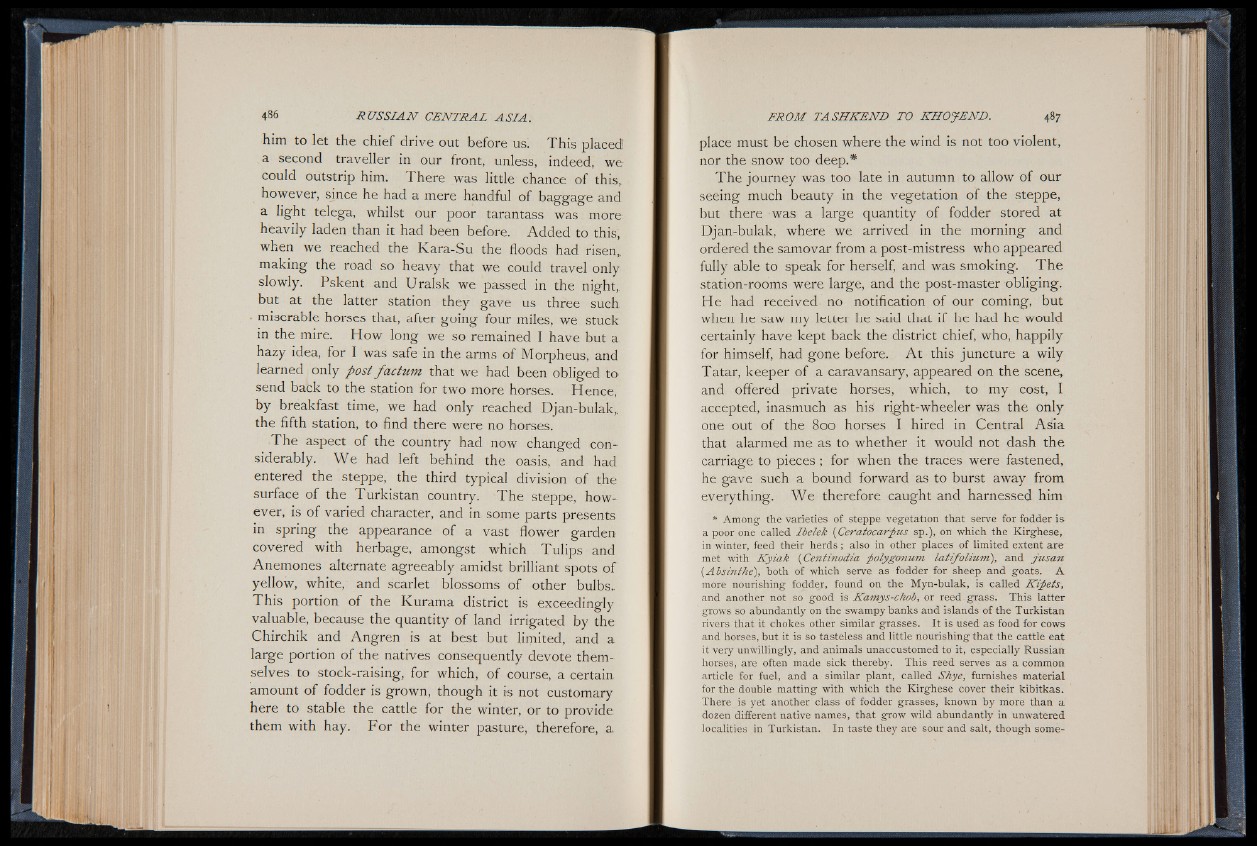
him to let the chief drive out before us. This placed!
a second traveller in our front, unless, indeed, we
could outstrip him. There was little chance of this,
however, since he had a mere handful of baggage and
a light telega, whilst our poor tarantass was more
heavily laden than it had been before. Added to this,
when we reached the Kara-Su the floods had risen,,
making the road so heavy that we could travel only
slowly. Pskent and Uralsk we passed in the night,,
but at the latter station they gave us three such
• miserable horses that, after going four miles, we stuck
in the mire. How long we so remained I have but a
hazy idea, for I was safe in the arms of Morpheus, and
learned only post factum that we had been obliged to
send back to the station for two more horses. Hence,
by breakfast time, we had only reached Djan-bulak,.
the fifth station, to find there were no horses.
The aspect of the country had now changed considerably.
We had left behind the oasis, and had
entered the steppe, the third typical division of the
surface of the Turkistan country. The steppe, however,
is of varied character, and in some parts presents
in spring the appearance of a vast flower garden
covered with herbage, amongst which Tulips and
Anemones alternate agreeably amidst brilliant spots o f
yellow, white, and scarlet blossoms of other bulbs.
This portion of the Kurama district is exceedingly
valuable, because the quantity of land irrigated by the
Chirchik and Angren is at best but limited, and a
large portion of the natives consequently devote themselves
to stock-raising, for which, of course, a certain
amount of fodder is grown, though it is not customary
here to stable the cattle for the winter, or to provide
them with hay. For the winter pasture, therefore, a
place must be chosen where the wind is not too violent,
nor the snow too deep.*
The journey was too late in autumn to allow of our
seeing much beauty in the vegetation of the steppe,
but there was a large quantity of fodder stored at
Djan-bulak, where we arrived in the morning and
ordered the samovar from a post-mistress who appeared
fully able to speak for herself, and was smoking. T he
station-rooms were large, and the post-master obliging.
He had received no notification of our coming, but
when he saw my letter he said that if he had he would
certainly have kept back the district chief, who, happily
for himself, had gone before. A t this juncture a wily
Tatar, keeper of a caravansary, appeared on the scene,
and offered private horses, which, to my cost, I
accepted, inasmuch as his right-wheeler was the only
one out of the 800 horses I hired in Central Asia
that alarmed me as to whether it would not dash the
carriage to pieces ; for when the traces were fastened,
he gave such a bound forward as to burst away from
everything. We therefore caught and harnessed him
* Among the varieties of steppe vegetation that serve for fodder is
a poor one called Ibelek (Ceratocarjus sp.), on which the Kirghese,
in winter, feed their herds ; also in other places of limited extent are
met with Kyiak (Centinodia ftolygonum latifolium), and ju sa n
{Absinthe), both of which serve as fodder for sheep and goats. A
more nourishing fodder, found on the Myn-bulak, is called Kijiets,
and another n o t , so good is Kamys-chob, or reed grass. This latter
grows so abundantly on the swampy banks and islands of the Turkistan
rivers that it chokes other similar grasses. It is used as food for cows
and horses, but it is so tasteless and little nourishing that the cattle eat
it very unwillingly, and animals unaccustomed to it, especially Russian
horses, are often made sick thereby. This reed serves as a common
article for fuel, and a similar plant, called Shye, furnishes material
for the double matting with which the Kirghese cover their kibitkas.
There is yet another class of fodder grasses, known by more than a
dozen different native names, that grow wild abundantly in unwatered
localities in Turkistan. In taste they are sour and salt, though some